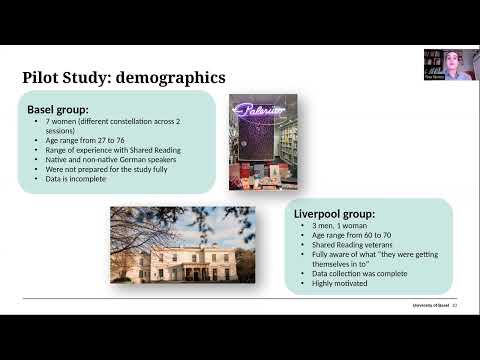 Speaker: Moniek Kuijpers @moniek.kuijpers
Speaker: Moniek Kuijpers @moniek.kuijpers
 Affiliation: Digital Humanities Lab, University of Basel, Switzerland
Affiliation: Digital Humanities Lab, University of Basel, Switzerland
 Co-authors: Tina Ternes & Antonia Vogler
Co-authors: Tina Ternes & Antonia Vogler
Title: The use of questionnaires in Shared Reading intervention studies
Abstract (long version below): This symposium is focused on the topic of Shared Reading. It showcases different empirical methods - both quantitative and qualitative - that can be used to investigate the effects of Shared Reading or look at how Shared Reading can be incorporated into research designs within empirical literary studies. We hope to inspire a discussion on the different choices of experiment designs: measures, stimulus materials, observation methods, as well as analytical approaches (coding schemes, statistical tests, etc.). The possibilities of using Shared Reading as a method for data collection will also be discussed.

 Long abstract
Long abstract
Previous research has suggested that participation in a Shared Reading program can have positive effects on well-being and reading pleasure (cf. Billington et al., 2016; Dowrick et al., 2012; Longden et al., 2015). So far, most of this research has taken place in the UK, and has emphasised the outcomes of the intervention, rather than the mechanisms by which they are established. In this paper, we will present our pilot study which is set up in Basel, Switzerland and Liverpool, UK – in collaboration with local Shared Reading providers. Data collection will start in March of this year. The pilot study comprises two Shared Reading sessions in both locations (reading the same text, in translation), before and after which participants fill out a pre- and post-test on reading habits and well-being. After each session, they also fill out the “Mechanisms of Shared Reading Questionnaire”, a newly developed instrument, which captures mechanisms of absorption (Kuijpers et al., 2014), interaction with reader leader, interaction with other participants, interaction with text, and well-being, operationalized as mood (Watson, Clark & Tellegen, 1988) and self-compassion (Neff et al., 2021). The four sessions will be video-recorded, transcribed and analysed (coded for presence of specific mechanisms) to complement the quantitative results. In this presentation, we will reflect on developing the design and the measures for this study in two languages simultaneously. We will also present our preliminary findings with respect to the relative importance of the different mechanisms under investigation, as well as discuss any differences and similarities between the two language areas under investigation. The pilot study is meant to help us decide how to adjust the design and measures of the main study, which will take place after the IGEL conference. Therefore, we are hoping to discuss any shortcomings or issues we ran into during pilot testing.
References
Billington, J., Humphreys, A. L., Jones, A., & McDonnell, K. (2016). A literature-based intervention for people with chronic pain. Arts & Health, 8(1), 13–31. doi: 10.1080/17533015.2014.957330.
Dowrick, C., Billington, J., Robinson, J., Hamer, A., & Williams, C. (2012). Get into Reading as an intervention for common mental health problems: Exploring catalysts for change. Medical Humanities, 38(1), 15–20. Get into Reading as an intervention for common mental health problems: exploring catalysts for change | Medical Humanities
Kuijpers, M. M., Hakemulder, F., Tan, E. S. H., & Doicaru, M. M. (2014). Exploring absorbing reading experiences. Developing and validating a self-report scale to measure story world absorption. Scientific Study of Literature, 4(1), 89–122.
Longden, E., Davis, P., Billington, J., Lampropoulou, S., Farrington, G., Magee, F., Walsh, E., & Corcoran, R. (2015). Shared Reading: Assessing the intrinsic value of a literature-based health intervention. Medical humanities, 41. https://doi.org/10.1136/medhum-2015-010704
Neff, K. D., Tóth-Király, I., Knox, M. C., Kuchar, A., & Davidson, O. (2021). The Development and Validation of the State Self-Compassion Scale (Long-and Short Form). Mindfulness, 12(1), 121-140.
Watson, D., Clark, L. A., & Tellegen, A. (1988). Development and validation of brief measures of positive and negative affect: the PANAS scales. Journal of personality and social psychology, 54(6), 1063.

